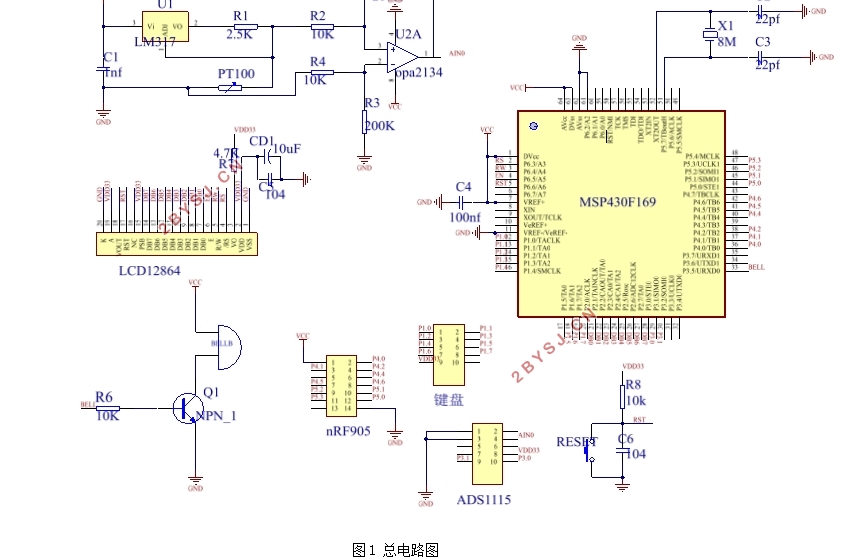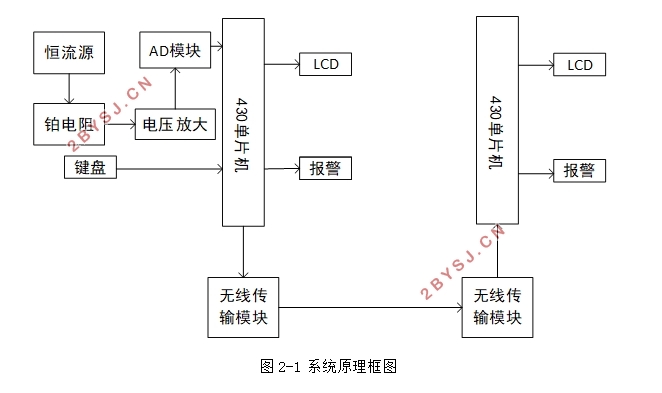PT100铂电阻智能测温系统的设计
无需注册登录,支付后按照提示操作即可获取该资料.
PT100铂电阻智能测温系统的设计(论文12000字)
摘要:本文针对温度的测量和温度数据的传输给出了自己的解决方法。较为详细地介绍了使用PT100铂热电阻这一温度感应元件,完成多种场合下的温度测量需求的过程。为提高测量精准度,提高系统对环境变化的适应能力,采用PT100四线制接法测量环境温度。主控芯片MSP430单片机经AD转换采集和处理电阻两端的电压,通过显示模块显示温度。在数据传输方面,为了方便快捷地传输温度数据,本文采用了无线传输模块无线传输的方式。
关键词:温度测量;PT100铂电阻;单片机;无线传输;
The design of PT100 platinum resistance intelligent temperature measurement system
Abstract: This paper presents my own solution for temperature measurement and temperature data transmission.This paper introduces in detail how to use the temperature sensing component of PT100 platinum resistance to complete the requirement of temperature measurement in various situations. In order to improve the accuracy of measuring and improve the adaptability of the system to the environment, the PT100 four-wire system is adopted to measure the temperature of the environment.The MSP430 single-chip collects and processes the voltage converted by AD module on both ends of the resistor and then displays temperature by means of display module. In the case of data transmission, this paper uses the wireless transmission mode with the help of wireless transmission module in order to facilitate the transfer of temperature data.
Key words: temperature measurement; PT100 platinum resistance; single chip microcomputer; wireless transmission


目 录
1.引言 5
1.1温度和温度测量的现状 5
1.2 PT100铂电阻简介 5
1.3研究目的和意义 5
2.设计方案论证 6
2.1本系统的总体设计要求 6
2.2本设计的技术方案 6
2.2.1单片机主控芯片的选择 7
2.2.2测温硬件电路的设计 8
2.2.3 AD模块的选择 9
2.2.4无线收发模块的选择 9
2.2.5液晶显示屏选择 10
3.硬件实现 11
3.1测温硬件电路的实现 11
3.1.1恒流源电路 11
3.1.2电压放大电路 12
3.1.3整体测温电路 13
3.2 ADS1115硬件连接 14
3.3 MSP430最小系统 15
3.4 按键矩阵 16
3.5无线传输模块电路 17
3.6显示屏模块电路 18
3.7其他外围硬件电路 20
3.7.1复位电路 20
3.7.2报警电路 21
4.程序设计 22
4.1铂电阻智能测温系统主程序设计 22
4.2 线性拟合程序 24
4.3模块子程序设计 25
4.3.1 ADS1115芯片控制程序 26
4.3.2 nRF905无线传输模块控制程序 26
5.系统调试 28
5.1硬件调试 28
5.2软件调试 29
6.结论 31
参考文献 31
致谢 33
附录 34
